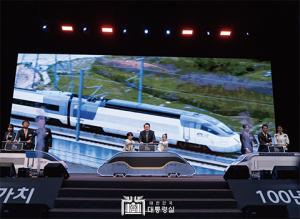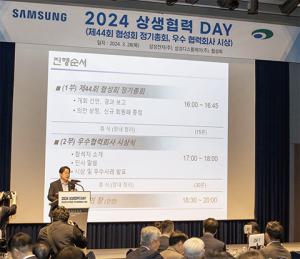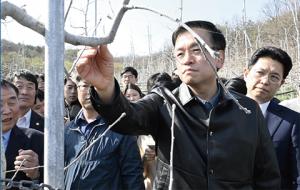 |
||
Panels:
Solidarity for Public Housing Development Land Owners and Residents
Korea Association of Property Appraisers
Three certified appraisers
PowerKorea
Government’s expropriation of land should be made after fair appraisals and assessments as it is a related to protecting people’s property rights. The problem still is that it is hard for land owners to know how the appraisals and assessments are carried out and whether they are really made fair. In most cases, land owners are excluded from the profits generated from development of the land and the government seems to expropriate the land as cheap as possible and sweep the profits as much as possible. To the land owners’ eye, nobody seems to know where the development profits flow into under the current practices. They say it is agreeable that part of the profits goes into public interest but they also have rights to share. Citizen’s Coalition for Economic Justice’s recent report says the development profit of Pangyo is more than 1 trillion won but not much is known where it has been used. PowerKorea set down with Solidarity for Public Housing Development Land Owners and Residents president Im Chae-gwan and Korea Association of Property Appraisers president Kim Sun-gu alongside three certified public appraisers.
Baek (editor of PowerKorea): How the compensation price is made in the new town development?
Im: The appraisers in charge have absolute power. We do not know in what way the price is made. Even if some of the land owners of the affected land know, they are often divided according to their own benefits and interests. To make it simple, the land owners are excluded in making the price so they have to depend on the appraisers on their side.
Baek: What is the legal base for land compensation?
Choi Gyeong-hwan (appraiser): It is the Constitution article 23 which states fair compensation. Based on this, the Land Compensation Act rules the procedures in detail.
Baek: Ok. How the price is made then?
Lee Hong-gyu (appraiser): The final price should go through several steps. An agreement should be made between the developer and the land owners first. In the compensation phase, the appraisal should be requested to three appraisers based on the Land Compensation Act article 68. The appraised price then is the final price for compensation. If acceptance is not made by either side, the final price should go through administrative litigation, protection of rights and decision to be final.
Baek: Is the price making different from the past?
Im: Appraisal value of land plays the foundation of the appraisal. It is both right and wrong at the same time because the appraisal value of land is one of many standards for valuing the land but not the absolute rule. Recent trend shows that the price of a land is affected by various factors like the current average price of the area. The system also is mostly computerized nowadays.
Baek: I learned that we are in the third phase of expropriation. Why is it so important to have right appraisers?
Im: The size of the lands in the third phase is vast and the appraisers will have had burden to divide the vast lands into appropriate boundaries because how to divide and evaluate patches can arouse angers between the land owners. In other words, having appraisers with professional knowledge and years of experience are vital.
Baek: They indeed seem to be important. How are they appointed?
Jeong Ji-young (appraiser): The developer appoints three appraisers. However, two of the three are recommended by the land owners and city’s mayor or provincial governor. 15 out of 17 cities and provinces are currently making request of recommendation to Korea Association of Property Appraisers.
Baek: Why is that?
Jeong: In order to secure independence of appraisers from each interested party, the government introduced city and province recommendation system in 2012. It is the same like the government does not give the right of choice of judge to the parties to a lawsuit. Korea Association of Property Appraisers is a legal cooperative and neural organization and this is the reason the cities and provinces make request to the association.
Baek: Is there any base for recommendation from mayors and governors as it might bring up pros and cons among land owners?
Lee: I think it is not about pros and cons but rather about whether the Constitutional value has been made for fair compensation. As long as the recommended appraisers keep this value and their independence, there won’t be an issue as stated on the Land Compensation Act article 68. The Ministry of Land, Infrastructure and Transport brought up standard guidelines and distributed in 2012 to cities and provinces that also brought up ordinances accordingly.
Baek: Mr. Im. What is the role and importance of appraisers recommended by cities and provinces?
Im: Some land owners seem to think that they might be biased to one side but I think it is just a prejudice. Even though the value of the land price in the intermediary phase has turned out not so profitable, land owners gain rather than lose at the end of the day. Their role can be like arbitrators and can raise credibility of the result. In addition, the remaining procedures can be made smoothly. Solidarity for Public Housing Development Land Owners and Residents has been in close consultation on this with them. To put it simple, they will draw results more helpful to land owners.
Baek: I heard some land owners are against civil and provincial recommended appraisers.
Jeong: We actually carried out a survey on this. To question on whether they had witnessed any actions to remove the appraisers in the appraisal, 69% said yes with 74% indirectly witnessed. To question on who requested the actions, 64% said land owners themselves. We concluded that the land owners might fear the mere result of the compensation but we believe that this fear is groundless.
Baek: I learned that a solidarity has been formed among the third phase new town land owners. What does it intend to achieve?
Jeong: I learned that the solidarity is discussing on fair compensation of course. For this, Solidarity for Public Housing Development Land Owners and Residents is working with it to draw rational results.
Baek: What are your advices to new town land owners?
Im: Most important thing is to have professional and experienced appraisers. As the land of the third phase new town is vast so it is a good idea to form an appraiser pool. To check the profile and performance of each appraiser is also important as well as getting tips from similar organizations such as Solidarity for Public Housing Development Land Owners and Residents. Once the price is made final, there is no turning back. It is important land owners themselves should gather into a single force rather than dispersed in one’s own interest. This actually prevents capable appraisers who will bring more profits to land owners work for them. Power of voice can happen if only we are solidified.
Baek: What they can get if they go with civil and provincially recommended appraisers?
Jeong: They can get comprehensive information on how they work and what benefits they generate. They can get support within the legal boundary to draw win-win results between appraisers and land owners.
Baek: Lastly, would you conclude the meeting with one or two helpful tips?
Kim: Civil and provincial recommended appraiser is a good system that can protect property rights of the land owners and fair compensation. Korea Association of Property Appraisers runs on transparent system and we will keep doing our best to draw fair and mutually agreeable results.
Im: Solidarity for Public Housing Development Land Owners and Residents will also keep working hard as we always did to protect property rights and to compensate due profits to land owners.
강진성 기자 wlstjdxp@naver.com







